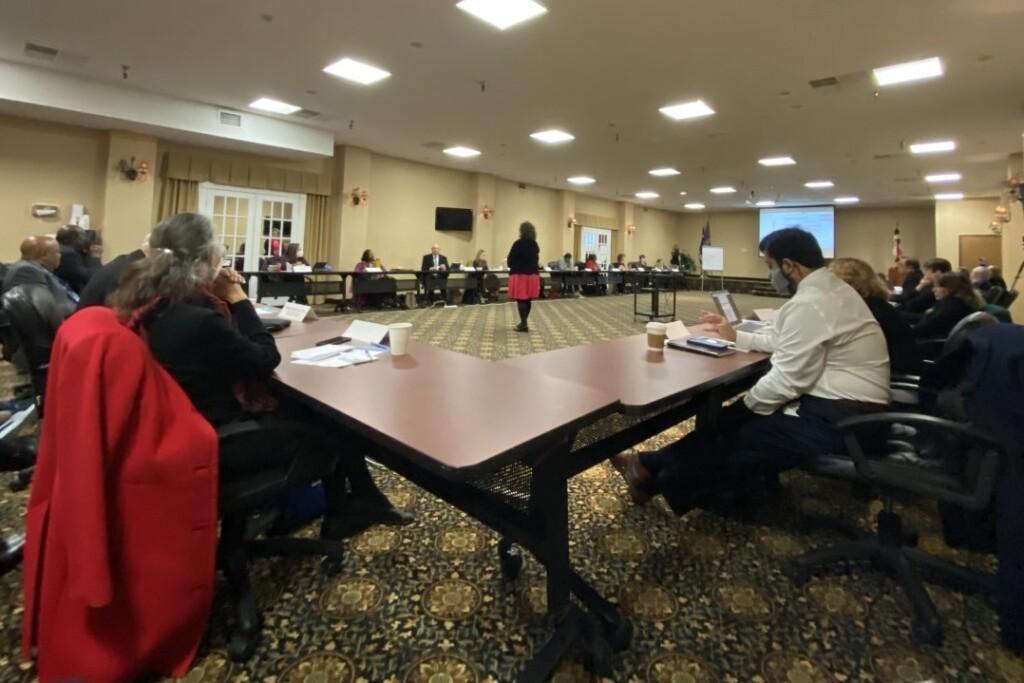It’s not easy to get several people together in person these days, but it happened Friday in Linthicum Heights, where two of Maryland’s major education oversight bodies held a joint meeting to discuss the state’s $3.8 billion Blueprint plan.
Members of the Maryland State Board of Education and Blueprint for Maryland’s Future Accountability and Implementation Board came together to align their visions on the comprehensive education reform plan adopted last week.
It’s unknown if a similar joint session will happen in the future, but all the participants Friday agreed on one key focus: collaboration.
“We’re all in to make this thing work,” said Clarence Crawford, who chairs the state Board of Education. “We recognize there will be challenges. We recognize there will be issues, but the first thing we really have to do is make a concerted effort to do what we can do. If we have to make some adjustments down the road, we’ll do that.”
Although there’s been agreement to revamp the state’s education system, some parents, educators and residents say more changes are needed in the 182-page Blueprint document.
Two of the state education board members, Vermelle Greene and Shawn Bartley, said the plan doesn’t specifically outline how it will help and provide additional resources for African American students. One of the plan’s four priorities, labeled as “pillars,” seeks to offer more resources for students in need.
The state acknowledged, based on an October report from the National Assessment of Education Progress that shows a decline in test scores in mathematics and reading among fourth- and eighth-grade students, an achievement gap persists among Black, Latino and economically disadvantaged students,
Greene, a retired educator of more than 40 years, said the Blueprint plan should outline male pedagogy, especially when it comes to teaching Black boys.
Greene said that during her time as an elementary assistant principal, she separated two Black boys who tussled with each other. She sat each boy in a different part of a room as she looked up phone numbers to call their parents.
She quickly noticed the boys talking and laughing with each other.
“Boys are different. Boys’ bodies are wired for movement. Also, boys need you to bond with them and boys don’t bond the same way girls do,” Greene said during a brief interview. “Teachers need to learn how to teach our boys.”
During the meeting, state Superintendent of Schools Mohammed Choudhury said the Blueprint plan will ensure dedicated funding will go to schools with low-income and special needs students and those in disadvantaged areas.
“That is directed exactly at communities where disproportionately they serve Black boys. It’s important to remember that,” he said.
However, he said the schools must also perform well and programs will be evaluated to make sure they’re working.
William “Brit” Kirwan, chancellor emeritus of the University System of Maryland and vice chair of the Blueprint board, said elements of teacher pedagogy are within the plan, such as specifying that all teachers will be required to receive cultural competency training.
Friday’s discussion also touched on the other three priorities that seek to improve early childhood education, hire and retain high-quality and diverse teachers and make sure students are prepared for college and technical careers.
Isiah “Ike” Leggett, background far left, gives remarks during a joint session with the Maryland State Board of Education and the Blueprint for Maryland’s Future Accountability and Implementation Board on Dec. 16 in Linthicum Heights. Leggett chairs the Blueprint board. Photo by William J. Ford.
Blueprint board chair Isiah “Ike” Leggett advised his education colleagues that work on the plan will take patience and teamwork.
The Blueprint board will remain intact until 2032 to ensure all 24 school systems implement the plan. The state Department of Education will be charged with designing certain programs, assist local school leaders to develop plans, collect data and perform other duties.
“It will take time, it will take effort, it will take us working together to get things done,” Leggett said. “This partnership is important.”
Meanwhile, only two people from both education bodies weren’t physically present Friday.
Blueprint board member Jennifer Lynch joined the meeting virtually.
Another member, Fagan Harris, wasn’t present. He will become chief of staff for Gov.-elect Wes Moore (D).
Harris must step down from the seat before Moore is sworn into office Jan. 18. Harris’s term on the board ends July 1, 2024.



Write a Letter to the Editor on this Article
We encourage readers to offer their point of view on this article by submitting the following form. Editing is sometimes necessary and is done at the discretion of the editorial staff.